外研版(2019)选择性必修 第四册Unit 2 Lessons in life Grammar—Review:passive voice课件(共22张PPT)
文档属性
| 名称 | 外研版(2019)选择性必修 第四册Unit 2 Lessons in life Grammar—Review:passive voice课件(共22张PPT) | 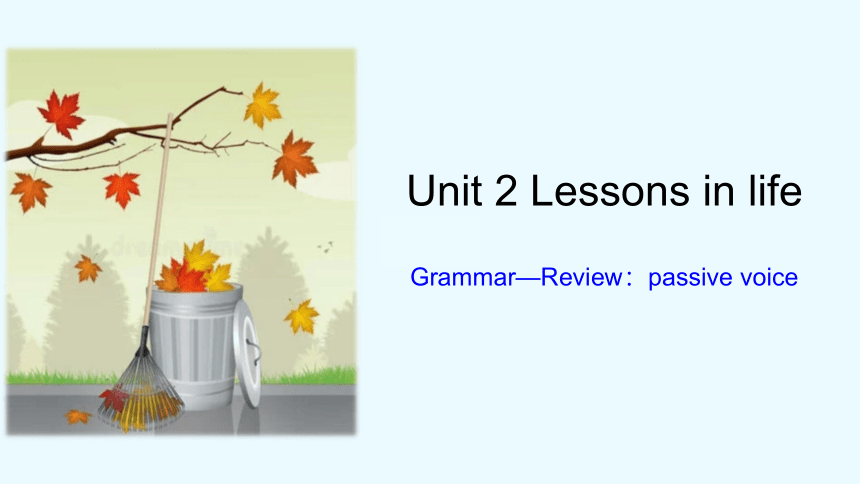 | |
| 格式 | pptx | ||
| 文件大小 | 2.6MB | ||
| 资源类型 | 教案 | ||
| 版本资源 | 外研版(2019) | ||
| 科目 | 英语 | ||
| 更新时间 | 2023-05-24 10:49:45 | ||
图片预览


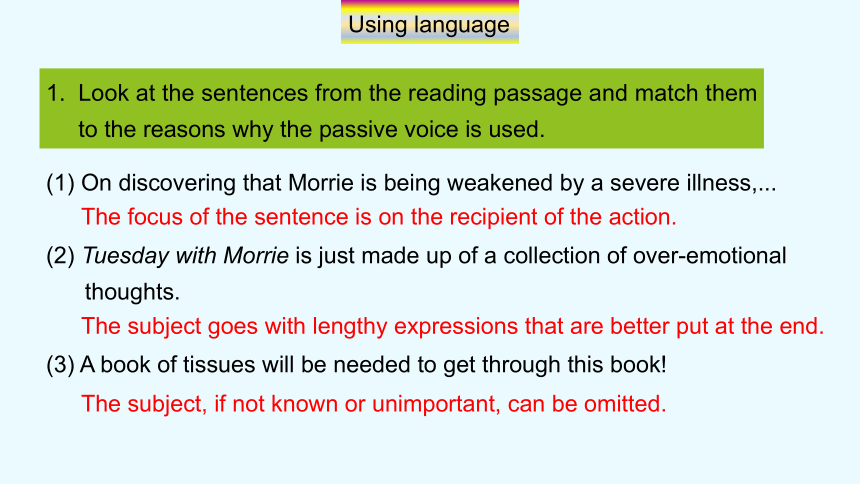
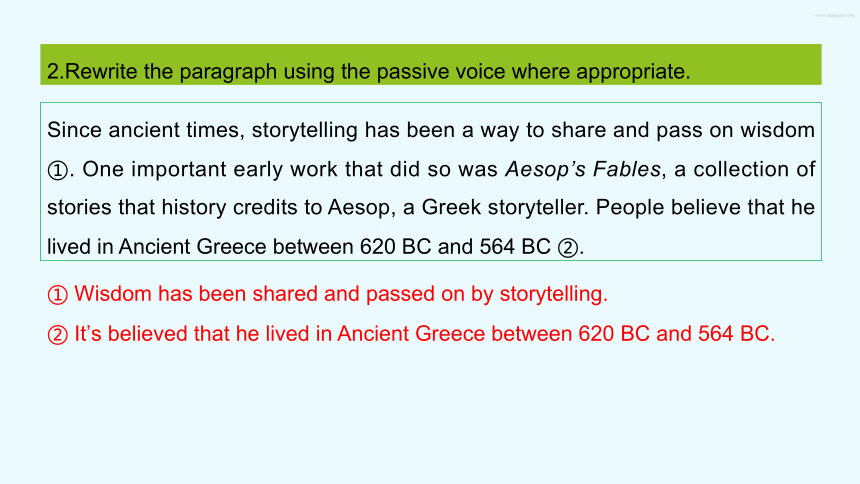
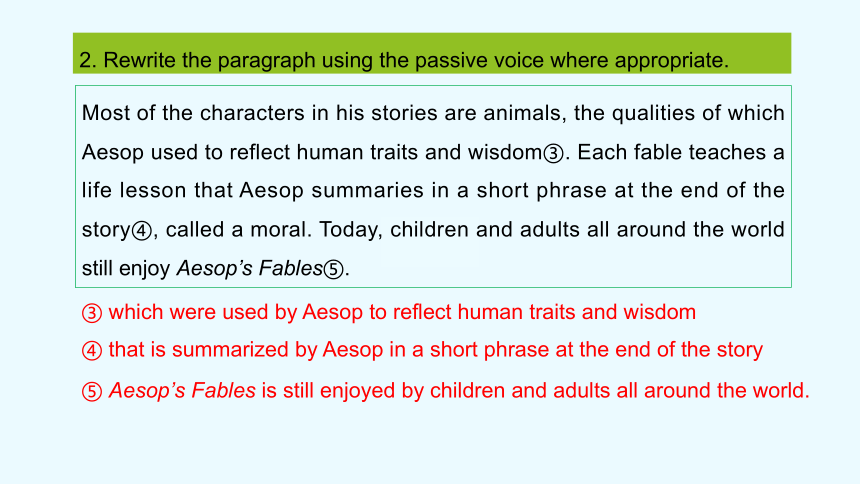
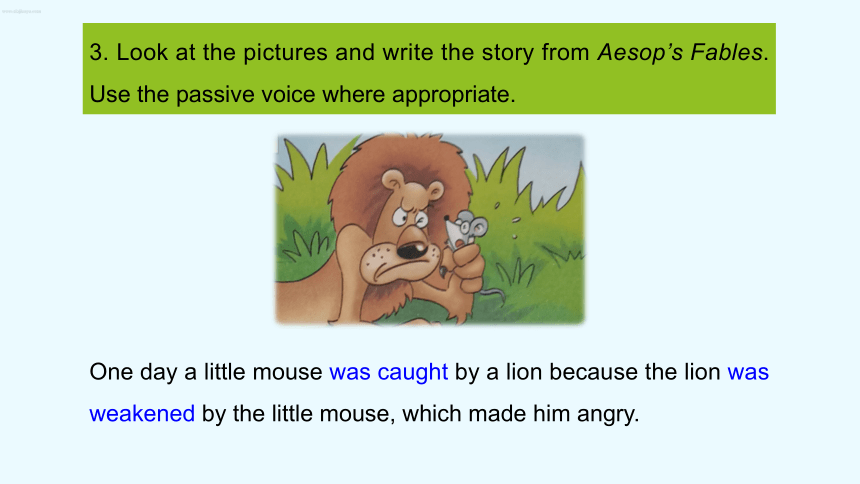
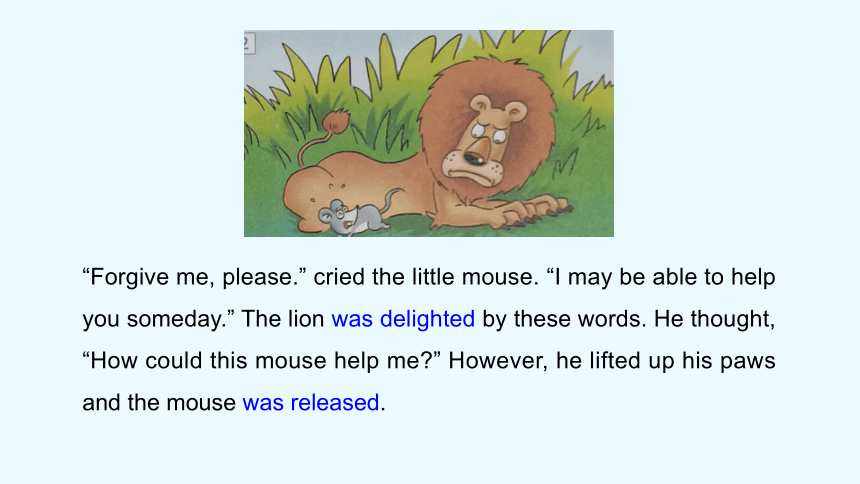
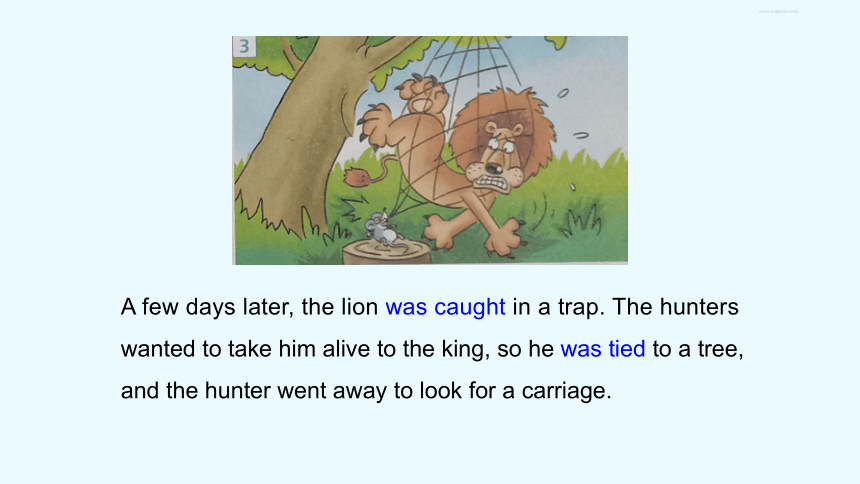
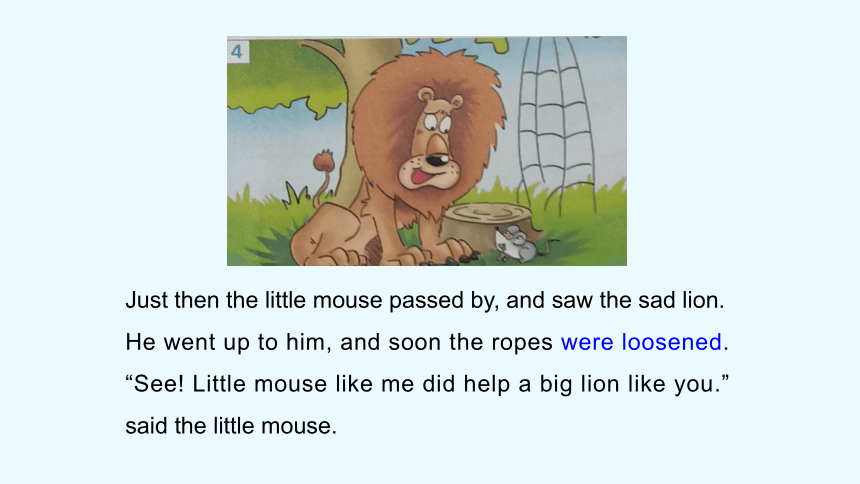
文档简介
(共22张PPT)
Unit 2 Lessons in life
Grammar—Review:passive voice
被动语态的魅力
How can our dreams be realized?
As is seen in the picture,we are rushed off our feet every day to fight for every goal and dream. Great efforts will be made to make it because Rome was not built in a day.
Using language
Look at the sentences from the reading passage and match them to the reasons why the passive voice is used.
(1) On discovering that Morrie is being weakened by a severe illness,...
(2) Tuesday with Morrie is just made up of a collection of over-emotional
thoughts.
(3) A book of tissues will be needed to get through this book!
The subject goes with lengthy expressions that are better put at the end.
The focus of the sentence is on the recipient of the action.
The subject, if not known or unimportant, can be omitted.
2.Rewrite the paragraph using the passive voice where appropriate.
Since ancient times, storytelling has been a way to share and pass on wisdom ①. One important early work that did so was Aesop’s Fables, a collection of stories that history credits to Aesop, a Greek storyteller. People believe that he lived in Ancient Greece between 620 BC and 564 BC ②.
① Wisdom has been shared and passed on by storytelling.
② It’s believed that he lived in Ancient Greece between 620 BC and 564 BC.
2. Rewrite the paragraph using the passive voice where appropriate.
Most of the characters in his stories are animals, the qualities of which Aesop used to reflect human traits and wisdom③. Each fable teaches a life lesson that Aesop summaries in a short phrase at the end of the story④, called a moral. Today, children and adults all around the world still enjoy Aesop’s Fables⑤.
③ which were used by Aesop to reflect human traits and wisdom
④ that is summarized by Aesop in a short phrase at the end of the story
⑤ Aesop’s Fables is still enjoyed by children and adults all around the world.
3. Look at the pictures and write the story from Aesop’s Fables. Use the passive voice where appropriate.
One day a little mouse was caught by a lion because the lion was weakened by the little mouse, which made him angry.
“Forgive me, please.” cried the little mouse. “I may be able to help you someday.” The lion was delighted by these words. He thought, “How could this mouse help me ” However, he lifted up his paws and the mouse was released.
A few days later, the lion was caught in a trap. The hunters wanted to take him alive to the king, so he was tied to a tree, and the hunter went away to look for a carriage.
Just then the little mouse passed by, and saw the sad lion. He went up to him, and soon the ropes were loosened. “See! Little mouse like me did help a big lion like you.” said the little mouse.
英语有两种语态
主动语态
被动语态
被动语态是由主动语态变来的。
1. The students have been working hard on their lessons and their efforts will be rewarded with success in the end.
2. Steam engines were used to pull the carriages and it must have been fairly unpleasant for the passengers,with all the smoke and noise.
被动语态的基本用法:
不知道或没有必要指明动作的执行者是谁时用被动语态;需要强调或突出动作的承受者或事件本身时也常用被动语态(by短语有时可以省略)。
现在 过去 将来 过去将来
一般式 am/is/are done was/were done will/shall be done would/should
be done
进行式 am/is/are being done was/were being done
完成式 have/has been done had been done will/shall have been done would/should have been done
被动语态的构成:
1. My washing machine is being repaired this week,so I have to wash my clothes by hand.
2. I was sent to the village last month to see how the development plan had been carried out in the past two years.
3. When fat and salt are removed from food,the food tastes as if it is missing something.
被动语态应注意的几个问题:
1. 主动变为被动时,宾语成了主语 ,(作补语的)不定式前需加to(位置不变)。
The boss made him work all day long.
→He was made to work all day long (by the boss).
2. 主动变为被动时,可将双宾语中的任何一个作为主语。
My friend gave me an interesting book on my birthday.
→An interesting book was given to me (by my friend) on my birthday.
→I was given an interesting book (by my friend) on my birthday.
3.短语动词变被动语态时,不要掉“尾巴”(即不要丢掉后面的介词或副词)。
The children were taken good care of (by her).
Your pronunciation and spelling should be paid attention to.
4.情态动词,be going to,be to,be sure to,have to等结构变为被动语态时,只需将它们后面的动词原形变为“be+过去分词”。
We can repair this watch in two days.
→This watch can be repaired in two days.
5.当句子的谓语为say,believe,expect,think,know,write,consider,report等时,被动语态有两种形式:(1)谓语动词用被动语态,动词不定式作主语补足语。(2)用it作形式主语,真正的主语在后面用主语从句来表示。
People say he is a smart boy.
→He is said to be a smart boy.
→It is said that he is a smart boy.
不使用被动语态的情况有哪些?
1. 表示状态的谓语动词,如:last,hold,contain,fit,cost等。
2. 表示归属的动词或短语,如have,belong to等。
3. 表示“希望、意图、喜好”的动词,如:wish,want,hope,like,love,hate等。
4. 宾语是反身代词或相互代词时,不能用被动语态。
5. 宾语是同源宾语、动词不定式、动名词等,不用被动语态。
英语中的主动表示被动情况有哪些?
1. 当连系动词feel,look,smell,taste,sound等后面接形容词时;
2. 当cut,read,sell,wear,write,wash等作为不及物动词表示主语内在“品质”或“性能”时;
3. 当动词表示“开始、结束、关、停、转、启动”等意义时。
4. break out,shut off,take place,turn off,work out等短语表示“发生、关闭、制定”等意思时。
The flowers smell sweet.
花儿散发着芳香。
This kind of cloth washes easily.
这种布料容易洗。
The lamps on the wall turned off.
墙上的灯熄灭了。
活学活用
1.All the kids will ___ (fit) in the back of the car.
2.When we got to the spot,the injured _____________ (send) to the hospital.
3.We've got to remember this group wants to look at how the Internet __________________ (use) in the classroom.
fit
is being used/is used
had been sent
单句语法填空
活学活用
1. 这首歌听起来很美。
___________________________
2. The song which ____________ (sing) on the stage now was just written by Albert,for whom being a famous musician is his forever dream.
3. It __________ (report) that many people die of traffic accidents each year.
完成句子
is being sung
This song sounds very wonderful.
is reported
Go over what we have learnt.
Finish the Exercises in this unit on workbook.
Homework
Unit 2 Lessons in life
Grammar—Review:passive voice
被动语态的魅力
How can our dreams be realized?
As is seen in the picture,we are rushed off our feet every day to fight for every goal and dream. Great efforts will be made to make it because Rome was not built in a day.
Using language
Look at the sentences from the reading passage and match them to the reasons why the passive voice is used.
(1) On discovering that Morrie is being weakened by a severe illness,...
(2) Tuesday with Morrie is just made up of a collection of over-emotional
thoughts.
(3) A book of tissues will be needed to get through this book!
The subject goes with lengthy expressions that are better put at the end.
The focus of the sentence is on the recipient of the action.
The subject, if not known or unimportant, can be omitted.
2.Rewrite the paragraph using the passive voice where appropriate.
Since ancient times, storytelling has been a way to share and pass on wisdom ①. One important early work that did so was Aesop’s Fables, a collection of stories that history credits to Aesop, a Greek storyteller. People believe that he lived in Ancient Greece between 620 BC and 564 BC ②.
① Wisdom has been shared and passed on by storytelling.
② It’s believed that he lived in Ancient Greece between 620 BC and 564 BC.
2. Rewrite the paragraph using the passive voice where appropriate.
Most of the characters in his stories are animals, the qualities of which Aesop used to reflect human traits and wisdom③. Each fable teaches a life lesson that Aesop summaries in a short phrase at the end of the story④, called a moral. Today, children and adults all around the world still enjoy Aesop’s Fables⑤.
③ which were used by Aesop to reflect human traits and wisdom
④ that is summarized by Aesop in a short phrase at the end of the story
⑤ Aesop’s Fables is still enjoyed by children and adults all around the world.
3. Look at the pictures and write the story from Aesop’s Fables. Use the passive voice where appropriate.
One day a little mouse was caught by a lion because the lion was weakened by the little mouse, which made him angry.
“Forgive me, please.” cried the little mouse. “I may be able to help you someday.” The lion was delighted by these words. He thought, “How could this mouse help me ” However, he lifted up his paws and the mouse was released.
A few days later, the lion was caught in a trap. The hunters wanted to take him alive to the king, so he was tied to a tree, and the hunter went away to look for a carriage.
Just then the little mouse passed by, and saw the sad lion. He went up to him, and soon the ropes were loosened. “See! Little mouse like me did help a big lion like you.” said the little mouse.
英语有两种语态
主动语态
被动语态
被动语态是由主动语态变来的。
1. The students have been working hard on their lessons and their efforts will be rewarded with success in the end.
2. Steam engines were used to pull the carriages and it must have been fairly unpleasant for the passengers,with all the smoke and noise.
被动语态的基本用法:
不知道或没有必要指明动作的执行者是谁时用被动语态;需要强调或突出动作的承受者或事件本身时也常用被动语态(by短语有时可以省略)。
现在 过去 将来 过去将来
一般式 am/is/are done was/were done will/shall be done would/should
be done
进行式 am/is/are being done was/were being done
完成式 have/has been done had been done will/shall have been done would/should have been done
被动语态的构成:
1. My washing machine is being repaired this week,so I have to wash my clothes by hand.
2. I was sent to the village last month to see how the development plan had been carried out in the past two years.
3. When fat and salt are removed from food,the food tastes as if it is missing something.
被动语态应注意的几个问题:
1. 主动变为被动时,宾语成了主语 ,(作补语的)不定式前需加to(位置不变)。
The boss made him work all day long.
→He was made to work all day long (by the boss).
2. 主动变为被动时,可将双宾语中的任何一个作为主语。
My friend gave me an interesting book on my birthday.
→An interesting book was given to me (by my friend) on my birthday.
→I was given an interesting book (by my friend) on my birthday.
3.短语动词变被动语态时,不要掉“尾巴”(即不要丢掉后面的介词或副词)。
The children were taken good care of (by her).
Your pronunciation and spelling should be paid attention to.
4.情态动词,be going to,be to,be sure to,have to等结构变为被动语态时,只需将它们后面的动词原形变为“be+过去分词”。
We can repair this watch in two days.
→This watch can be repaired in two days.
5.当句子的谓语为say,believe,expect,think,know,write,consider,report等时,被动语态有两种形式:(1)谓语动词用被动语态,动词不定式作主语补足语。(2)用it作形式主语,真正的主语在后面用主语从句来表示。
People say he is a smart boy.
→He is said to be a smart boy.
→It is said that he is a smart boy.
不使用被动语态的情况有哪些?
1. 表示状态的谓语动词,如:last,hold,contain,fit,cost等。
2. 表示归属的动词或短语,如have,belong to等。
3. 表示“希望、意图、喜好”的动词,如:wish,want,hope,like,love,hate等。
4. 宾语是反身代词或相互代词时,不能用被动语态。
5. 宾语是同源宾语、动词不定式、动名词等,不用被动语态。
英语中的主动表示被动情况有哪些?
1. 当连系动词feel,look,smell,taste,sound等后面接形容词时;
2. 当cut,read,sell,wear,write,wash等作为不及物动词表示主语内在“品质”或“性能”时;
3. 当动词表示“开始、结束、关、停、转、启动”等意义时。
4. break out,shut off,take place,turn off,work out等短语表示“发生、关闭、制定”等意思时。
The flowers smell sweet.
花儿散发着芳香。
This kind of cloth washes easily.
这种布料容易洗。
The lamps on the wall turned off.
墙上的灯熄灭了。
活学活用
1.All the kids will ___ (fit) in the back of the car.
2.When we got to the spot,the injured _____________ (send) to the hospital.
3.We've got to remember this group wants to look at how the Internet __________________ (use) in the classroom.
fit
is being used/is used
had been sent
单句语法填空
活学活用
1. 这首歌听起来很美。
___________________________
2. The song which ____________ (sing) on the stage now was just written by Albert,for whom being a famous musician is his forever dream.
3. It __________ (report) that many people die of traffic accidents each year.
完成句子
is being sung
This song sounds very wonderful.
is reported
Go over what we have learnt.
Finish the Exercises in this unit on workbook.
Homework
